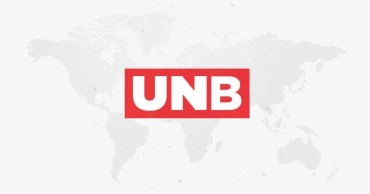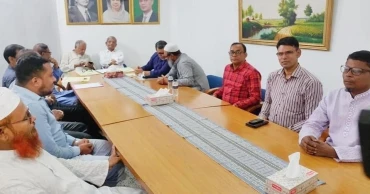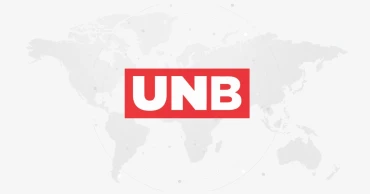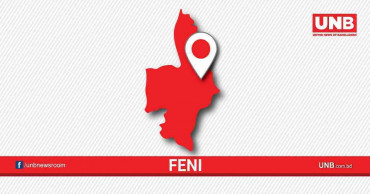Curfew
Southern Nepal border city under curfew following Mosque vandalism
Authorities in southern Nepal imposed a strict curfew in the border city of Birgunj after tensions flared between Hindu and Muslim communities following the vandalism of a mosque over the weekend, officials said Tuesday.
The Parsa District Administration ordered residents to stay off the streets, banning all public movement, demonstrations and gatherings. Security forces were authorized to take strong action against anyone violating the curfew, including the use of firearms if necessary, according to the official notice.
Police and army units armed with automatic weapons were deployed across Birgunj, a major commercial hub located about 130 kilometers (80 miles) south of Kathmandu. The city serves as Nepal’s most important land border crossing with India and is a critical gateway for fuel, food and other essential imports entering the country.
Nepal’s Gen Z Protesters disillusioned with government they helped install
The unrest began Sunday when Muslim groups organized protests after a mosque in a nearby town was vandalized. Later the same day, Hindu groups held their own demonstrations, raising fears that the situation could escalate. Protest activity has continued intermittently since then, prompting authorities to impose the curfew to prevent violence.
Officials said there have been no serious injuries or large-scale clashes between the two communities so far. Some minor scuffles were reported between protesters and riot police as officers worked to keep the groups apart and restore calm.
Interreligious violence is uncommon in Nepal, a predominantly Hindu country where Muslims make up a small minority of the population. Most Muslim communities are concentrated in southern districts near the Indian border, including areas such as Birgunj, where close cultural and economic ties exist across the frontier.
Local officials said the curfew would remain in place until tensions ease and warned residents to comply with security directives as authorities continue monitoring the situation closely.
1 month ago
Gopalganj clashes: Another dies, raising death toll to 5
Another person, who had sustained bullet injuries during clashes involving law enforcers, Awami League members, and banned Chhatra League activists in Gopalganj on Wednesday, died early Friday, raising the death toll from the incident to five.
The deceased was identified as Ramjan Munshi, 32, son of Akbar Munshi of the Thanapara area under Gopalganj Sadar upazila.
Ramjan, a rickshaw-puller, breathed his last around 2:45am while undergoing treatment in Ward No-101 of Dhaka Medical College Hospital (DMCH), said Inspector Md Faruk, in charge of the hospital police outpost.
The body has been kept at the hospital morgue for autopsy, he added.
The victim’s brother, Hira Munshi, said, “On the day of the incident (Wednesday), while returning after dropping off a passenger from his rickshaw near the cinema hall in Gopalganj Sadar area, my brother got trapped in the violence and was shot.”
Gopalganj curfew to continue until further order with 3-hr break on Friday
He was rescued and first taken to the Sadar Hospital and later shifted to the DMCH, where he died on Thursday night, he added.
On Wednesday, more than 50 people, including police personnel, were injured in a series of clashes between AL, banned Chhatra League activists, and law enforcers over the NCP’s scheduled rally in Gopalganj Sadar upazila.
Of them, four people were declared dead that night, and those critically injured were shifted to several hospitals, including DMCH, from the district for advanced treatment.
Those earlier reported dead are Sohel Mollah, Dipto Saha, Imon Talukdar and Ramjan Kazi.
In light of the deteriorating situation, the local administration initially imposed Section 144 in Sadar upazila and later enforced a curfew for 22 hours beginning at 8pm on Wednesday.
Just before the expiration of the curfew on Thursday, the government extended it until further notice, with a three-hour pause from 11am to 2pm.
The curfew remained in effect from 6pm on Thursday until 11am on Friday, and then again from 2pm onwards until further notice, according to a statement from the Ministry of Home Affairs on Thursday.
Curfew continues in Gopalganj; NCP's nationwide protests today
Meanwhile, the government has formed a three-member body to investigate the violent incidents that resulted in loss of lives and property.
As the curfew continues, law enforcement personnel, including police, Army, and Rapid Action Battalion, are patrolling the district town to maintain law and order.
Public movement on the streets remains minimal, as people have been discouraged from leaving their homes unless it is emergency.
7 months ago
Curfew imposed in Gopalganj amid escalating tensions
The government on Wednesday imposed curfew in Gopalganj district amid heightening tensions over clashes between police and Awami League activists over an NCP rally.
The curfew will remain in force from 8pm on Wednesday to 6pm on Thursday, according to the Chief Adviser’s press wing.
Supporters of the AL, banned BCL and other associate bodies, equipped with sticks and brickbats took positions at different streets and lanes, prompting Rab, army and BGB teams to intensify their patrol in the city.
The local administration slapped Section-144 in Gopalganj Sadar.
Deputy Commissioner of the district Muhammad Kamruzzaman enforced Section-144 but did not set any timeframe for it.
Alongside the police, Rapid Action Battalion (Rab) and army personnel, four platoons of Border Guard Bangladesh (BGB) have been deployed in the Sadar headquarters to avoid further untoward incidents, said Md Shariful Islam, public relations officer of the BGB Headquarters.
A tense situation was prevailing in the city as chase and counter-chase continued between the law enforcers and the AL supporters.
Violence in Gopalganj ‘utterly indefensible’, those responsible to face justice: Govt
Meanwhile, the interim government said the use of violence in Gopalganj is ‘utterly indefensible’ and those responsible for this brutality will face justice.
“Let it be made absolutely clear: violence has no place in our nation. Justice must and will prevail,” said the interim government in a statement on the attacks on a peaceful NCP rally in Gopalganj.
The government said preventing young citizens from peacefully holding a rally to commemorate the one-year anniversary of their revolutionary movement is a ‘shameful violation’ of their fundamental rights.
7 months ago
Banks won’t charge extra fees for late payment of credit cards bills, loan installments: Bangladesh Bank
Considering the current situation, Bangladesh Bank has instructed all banks and financial institutions to not charge any extra fees for late payment of credit card bills, and loan installments.
The central bank issued a directive to banks and financial institutions in two separate notifications in this regard on Wednesday.
Those who had time to pay their loan installments, credit card bills, and savings deposit installments during the curfew and public holidays can make the payments till July 31. Bangladesh Bank has said that banks and financial institutions will not collect any additional interest, penalties or late fees for installments/card bills payable between July 18 and 25. No savings scheme can be canceled due to failure to pay installment during this time.
According to the central bank notification, many borrowers and credit card users have not been able to pay their dues to the banks on time due to the current situation.
Read more: Offices, banks reopen for four hours; Commuters suffer amid traffic gridlock
Besides, many depositors could not deposit installments of various savings schemes including Deposit Pension Scheme (DPS) on time. Under the circumstances, the new guidelines will be effective from July 18 to 25 in respect to dues of loans, credit card bills, and installments of various savings schemes including DPS.
The Bangladesh Bank directive stated that if the loan and credit card dues are paid by July 31, any interest or profit and penalty interest, additional interest, excess profit, late fee on the outstanding amount will be deducted. If installments of savings schemes are paid by July 31, no late fee or penalty can be collected.
Apart from this, interest or profit and penalty interest or late fee on any loan or credit card and any kind of late fee or penalty on various savings schemes that has already been collected has to be refunded or adjusted.
Read more: Overcrowding and long queues as banks reopen today for only 4 hours
1 year ago
Curfew in Jamaica district after gunmen wound 7 boarding bus
Police enforced a curfew in a community on the southern fringes of Jamaica’s capital Saturday after gunmen fired on people boarding a public minibus, wounding seven, including three children.
The Jamaica Constabulary Force gave no information on the conditions of the wounded from the brazen attack, which occurred at midafternoon Friday in Seaview Gardens, a poor area of Kingston.
There was speculation the gunmen were targeting one of the people trying to get on the bus, but authorities did not comment on a possible motive. Conflict among rival gangs has been blamed for an uptick in violence in the community.
Authorities ordered a two-day curfew in Seaview Gardens, and police said they were looking for two men for questioning about the shooting.
Crime statistics released by the police say 303 people were killed on the island in the first three months of this year, 20% fewer than during the same period of 2022.
2 years ago
BNP ready to defy ‘curfew’ even to hold Khulna rally, says Mirza Fakhrul
BNP Secretary General Mirza Fakhrul Islam Alamgir said on Wednesday that his party was ready to defy a curfew even to make their upcoming anti-government rally in Khulna a success.
He made the remarks in the wake of a decision by transport owners and workers in Khulna to suspend bus services ahead of their party’s rally in the southwestern region’s biggest city on Saturday.
“They (govt) also stopped vehicle movements in Mymensingh, but they failed to stop people. In the same way, you’ll see people will join the rally in Khulna to push their demand for democracy, no matter whether the transport service is suspended or not,” he told reporters at BNP Chairperson’s Gulshan office after talks with two political parties.
He said people came to their Mymensingh rally by trawlers, boats, rickshaws and on foot.
“Even, many rickshawpullers did not take fare from them (BNP leaders and activists). This is called people’s participation. Even, we won’t concede to any hartal, curfew as we’ll be present there (Khulna) by braving all obstacles,” he said.
As his attention was drawn to the Prime Minister’s previous comment that BNP would be allowed to hold political programmes, Fakhrul said Awami League still could not live up to its any word or promise.
“They do the opposite of what they say. So, there’s no reason to believe Awami League.”
About Awami League general secretary Obaidul Quader’s remark that BNP is daydreaming of another 1/11 like political changeover, he said the Awami League has the habit of doing that.
“That’s why they think like that." “We don’t daydream. We dream of seeing a democratic Bangladesh, restoring people’s voting rights, and establishing true democracy," the BNP leader observed.
Replying to a question, he said BNP has no objection if the ruling party takes to the streets exercising their democratic rights. “At the same time, the democratic rights of all the opposition parties also must be ensured. As government, it’s their responsibility to do.”
Earlier on Wednesday, Khulna bus-minibus owners association and motor workers’ union decided to keep bus services suspended on October 21 and 22 due to the BNP’s divisional rally on Saturday (October 22).
Read: BNP public rally: Bus services in Khulna to remain suspended Oct 21, 22
As part of its divisional rallies, BNP is expected to organise the rally on Sonali Bank premises in Khulna city in protest against the price hikes in fuel and daily essentials and the killing of five BNP leaders and activists in the recent movement and demanding the unconditional release of BNP Chairperson Khaleda Zia.
The party has already arranged two massive rallies in Chattogram and Mymensingh.
BNP leaders alleged that many BNP leaders and activists were attacked, arrested and implicated in ‘false’ cases in Chattogram and Mymensingh over holding the rally.
Talks with two parties
Earlier, Fakhrul had separate meetings with the delegations of Bangladesh Jatiya Dal and Bangladesh Islamic Party, two components of the BNP-led 20-party alliance, as part of their party’s second round of political dialogue.
Fakhrul said that they agreed to some demands of their coming simultaneous movement, including the ouster of the current government, restoration of democracy, unconditional release of Khaleda Zia and withdrawal of the false cases filed against the opposition leaders and activists and holding the next polls under a non-party neutral government.
“We’ll initiate a simultaneous movement focusing on these issues.”
3 years ago
Sri Lanka imposes curfew as cops fire tear gas at protesters
Police imposed a curfew in Sri Lanka’s capital and surrounding areas on Friday, a day before a planned protest demanding the resignations of the country’s president and prime minister because of the economic crisis that has caused severe shortages of essential goods and disrupted people’s livelihoods.
Hours before the curfew announcement, police fired tear gas and water cannons to disperse thousands of protesting students wearing black clothes, holding black flags, shouting anti-government slogans and carrying banners saying “Enough — now go.”
The protesters and other critics have said that President Gotabaya Rajapaksa is responsible for the economic crisis, the worst since the country's independence in 1948. They also blame Ranil Wickremesinghe, who became prime minister two months ago, for not delivering on promises to end the shortages.
Civic and opposition activists have announced that thousands more protesters will gather in Colombo on Saturday. But the police announcement of the curfew said it took effect at 9 p.m. and will last until further notice in Colombo and its suburbs.
The curfew announcement drew criticism from government opponents and the Bar Association of Sri Lanka, which said the “curfew is blatantly illegal and a violation of the fundamental rights.”
The bar association statement asked police to immediately withdraw what the association called an "illegal order” imposing the curfew.
Opposition leader Sajith Premadasa called the curfew“a fraud."
Read: Sri Lanka PM says talks with IMF difficult due to bankruptcy
“Get on to the streets tomorrow. Defy the dictatorship and join with the people to make democracy victorious. Yes we can,” he said in a tweet.
The U.S. Ambassador to Sri Lanka, Julie Chung, asked people to protest peacefully and asked the military and police “to grant peaceful protestors the space and security to do so.”
“Chaos & force will not fix the economy or bring the political stability that Sri Lankans need right now,” Chung said in a tweet.
Sri Lanka is nearly bankrupt and has suspended repayments of $7 billion in foreign debt due this year. It must pay back more than $5 billion annually until 2026. Its foreign reserves are nearly wiped out and it is unable to import food, fuel, cookng gas and medicine.
A lack of fuel to run power stations has resulted in extended daily power cuts. People must stand in lines for hours to buy fuel and gas. The country has survived mostly on credit lines extended by neighboring India to buy fuel and other essentials.
Because of the economic crisis, inflation has spiked and prices of essentials have soared, dealing a severe blow to poor and vulnerable groups.
Due to the fuel and power shortages, schools have been shut for weeks and the government has asked state employees other than those in essential services to work from home.
The country is negotiating with the International Monetary Fund on a bailout package, but Wickremesinghe said this week that the negotiations are difficult because Sri Lanka is effectively bankrupt. He earlier said the country’s economy had “collapsed.”
The economic crisis has triggered a political upheaval, with widespread anti-government protests. Protesters have blocked main roads to demand fuel, and people in some areas have fought over limited stocks.
Also read: With no fuel and no cash, Sri Lanka keeps schools closed
In Colombo, protesters have occupied the entrance to the president’s office for nearly three months to demand his resignation. They accuse him and his powerful family, which includes several siblings who until recently held Cabinet positions, of precipitating the crisis through corruption and misrule.
Months of protests have nearly dismantled the Rajapaksa political dynasty that has ruled Sri Lanka for most of the past two decades.
One of Rajapaksa’s brothers resigned as prime minister last month, and two other brothers and a nephew quit their Cabinet posts earlier.
President Rajapaksa has admitted he did not take steps to head off the economic collapse early enough, but has refused to leave office. It is nearly impossible to oust presidents under the constitution unless they resign on their own.
3 years ago
Fulgazi upazila administration imposes curfew following AL-BNP clash
The administration of Feni’s Fulgazi upazila has imposed a curfew at Daulatpur village of the upazila on Saturday.
The imposition of the curfew came after a clash between Fulgazi chapters of Bangladesh Awami League (AL) and Bangladesh Nationalist Party (BNP) on Friday.
According to the order signed by Fulgazi Upazila Nirbahi Officer (UNO) Ashrafun Nahar, both the AL and the BNP’s Fulgazi units had called for relief distribution programs at the upazila’s Daulatpur village. A clash ensued when both groups tried to conduct their pre-scheduled programs simultaneously.
According to Alal Uddin Alal, Member Secretary of Feni District BNP, prior to Friday’s attack, the AL men launched another attack at their preparatory meeting for the relief program, leaving 30 of their activists injured.
Read: Section 144 to be imposed in Feni on Wednesday
General Sceretary of Fulgazi Upazila AL Harunur Rashid Majumder claimed that it was the BNP men who had attacked Sadar union Jubo League President Nizam Company and injured five of his men.
Md Moin Uddin, Officer In-charge of Fulgazi police station, said that the curfew has been imposed to contain any untoward situation.
“Police have ramped up its patrolling in the area. We are being cautious to thwart any unexpected situation,” Moin said.
3 years ago
Protests over shortages roil Sri Lanka despite curfew
Opposition lawmakers and people angered by the government's handling of Sri Lanka's worst economic crisis on Sunday marched to denounce the president's move to impose a nationwide curfew and state of emergency, as protests over food and fuel shortages swelled.
Internet users were unable to access Facebook, Twitter, YouTube, WhatsApp and other social media platforms for nearly 15 hours on Sunday after authorities blocked access.
Apparently due to the growing criticism, access to social media was later restored. The platforms have been used to organize protests calling for President Gotabaya Rajapaksa to resign, saying he is responsible for the country’s deepening economic woes.
Also read: Sri Lanka blocks social media amid calls for more protests
Sri Lanka is under a nationwide curfew until Monday morning after Rajapaksa assumed emergency powers at midnight Friday. More protests were taking place throughout the country on Sunday as anger over people waiting in long lines for essential foods, fuel and hourslong rotating power cuts boiled over.
Facebook posts showed crowds of young people shouting anti-government slogans and singing songs.
The emergency declaration by Rajapaksa gives him wide powers to preserve public order, suppress mutiny, riot or civil disturbances or for the maintenance of essential supplies. Under the decree, the president can authorize detentions, seizure of property and search of premises. He can also change or suspend any law except the constitution.
In the capital, the lawmakers marched toward Colombo's main square, shouting slogans and carrying placards that read “Stop Suppression” and “Gota go home.” Gota is a shortened version of the president's first name.
Armed soldiers and police officers set up barricades on the road leading to the square, which was built to commemorate the country's independence from Britain in 1948.
Also read: Sri Lanka imposes 36-hour curfew under state of emergency
“This is unconstitutional," opposition leader Sajith Premadasa told troops who prevented the lawmakers from walking to the square. "You are violating the law. Please think of the people who are suffering. Why are you protecting a government like this?”
Another lawmaker, Nalin Bandara, said: “How long can they rule under emergency? The first instance when the curfew is lifted, people are going to be back on the streets."
Sri Lanka faces huge debt obligations and dwindling foreign reserves, and its struggle to pay for imports has caused a lack of basic supplies. People wait in long lines for gas, and power is cut for several hours daily because there’s not enough fuel to operate power plants and dry weather has sapped hydropower capacity.
The island nation’s economic woes are blamed on a failure of successive governments to diversify exports, instead relying on traditional cash sources like tea, garments and tourism, and on a culture of consuming imported goods.
The COVID-19 pandemic dealt a heavy blow to the economy with the government estimating a loss of $14 billion in the last two years. Protesters also point to mismanagement — Sri Lanka has immense foreign debt after borrowing heavily on projects that don’t earn money. Its foreign debt repayment obligations are around $7 billion for this year alone.
The crisis has hit people from all walks of life. Middle class professionals and business people who would normally not take part in street protests have been holding nightly rallies with candles and placards in many parts of the country.
3 years ago
Sri Lanka imposes 36-hour curfew under state of emergency
Sri Lanka declared an islandwide curfew from 6 p.m. Saturday to 6 a.m. Monday as the country faced a severe power crisis and rising inflation.
On Friday, President Gotabaya Rajapaksa issued the Extraordinary Gazette declaring a state of public emergency in Sri Lanka with immediate effect.
READ: Sri Lanka’s president declares emergency amid protests
Rajapaksa said the emergency was declared in the interests of public security, protection of public order and the maintenance of supplies and services essential to the life of the community.
A protest has been planned via social media for Sunday.
3 years ago

















